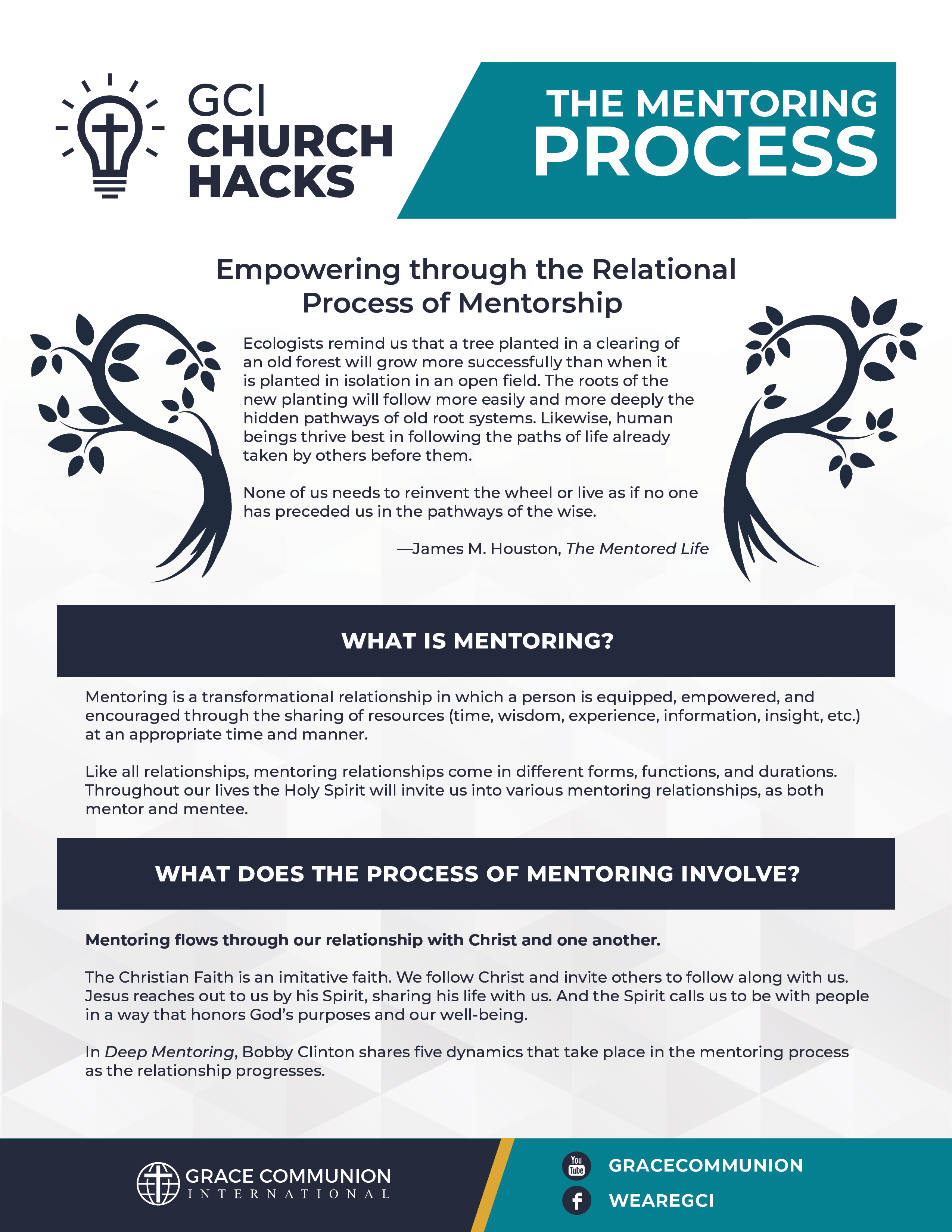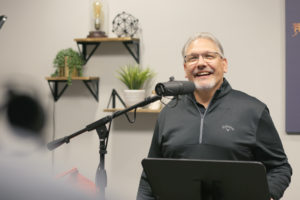Wake Up, Sleeper! w/ Marty Folsom
Welcome to the Gospel Reverb podcast. Gospel Reverb is an audio gathering for preachers, teachers, and Bible thrill seekers. Each month, our host, Anthony Mullins, will interview a new guest to gain insights and preaching nuggets mined from select passages of scripture, and that month’s Revised Common Lectionary.
The podcast’s passion is to proclaim and boast in Jesus Christ, the one who reveals the heart of God, Father, Son, and Holy Spirit. And now onto the episode.
Anthony: Hello friends, and welcome to the latest episode of Gospel Reverb. Gospel Reverb is a podcast devoted to bringing you insights from scripture found in the Revised Common Lectionary and sharing commentary from a Christ-centered and trinitarian view. I’m your host Anthony Mullens, and it brings me great delight to welcome our guest, Dr. Marty Folsom.
Marty is a relational theologian who did his PhD with Alan Torrance and Doug Campbell, asking what it means to be free persons in the context of our relational ways of being, especially with God, but also with others. He is the author of the Face-to-Face Trilogy, a relational take on rediscovering the relational nature of faith and science, learning to live with a deeper sense of personal connection. His most recent book is Karl Barth’s Church Dogmatics for Everyone. You can pick it up at Amazon or other major book outlets.
Marty, thank you for being with us and welcome to the podcast. This is your second time being with us at Gospel Reverb. But if I’m being real, it’s actually the third time, because last month we recorded an episode, but yours truly—me—used the incorrect lectionary passages for that episode.
I’m just so delighted that you would trust us to come back and try this again one time. But I want you to know that I have double and triple checked the passages. They’re right this time. So, I think we’re good to go since—yes, hallelujah.
It’s been a while since our listing audience has heard from you, so why don’t you catch us up on how you are participating with the Lord these days?
Marty: Right. Well, I have moved from Snohomish, Washington, to [inaudible] Island, so I have a beautiful window to look out and see all of God’s good creation. And I moved my library—it was 16,000 books and I’m down to about 12,000 books behind me now.
So that has been a huge piece, is just moving and getting settled in for a next chapter of writing. As you said, my first volume of the Karl Barth series came out. And I get comments virtually every week, people saying, oh, this is what I needed. This is really helping me to understand who Barth is and what he’s doing, and to really open up the nature of the gospel as God’s good givenness to us and the person of Jesus.
Volume 2 is in, and in May that should be out, which I’m really looking forward to that coming out.
It really builds on the theme of who is this God who’s revealed, the God who loves in freedom, and follows themes of music. Karl Barth woke every morning and listened to Mozart in his house. So somehow, I can see Mozart playing in the back of people’s mind as they read that.
And I’m almost three-fourths of the way through the third volume as well. So that’s what I’m doing every day anywhere from four to six hours is writing on Karl Barth, as well as engaging TF Torrance studies and the Psalms and other things that I’m writing on. My life is largely an author and a podcaster now.
You’re not the only podcast actually that I’ve had. I’ve had about six podcasts. So, I’m delighted that the world wants to hear the good news that is going out into the world.
Anthony: Amen and amen. Only 12,000 books. Marty, you need to step up with your game, brother.
Marty: It was hard to get down to that. It’s a matter of room. But anyway, I’ve been out there this morning pulling books off in preparation for this. So, it’s a delight to have resources.
Anthony: Yes, yes. Well, welcome back. It’s so good to hear your voice, and let’s get to why we’re here. Let’s look at the passages for this month. They are:
Romans 4:1-5, 13-17 “Justified”
Romans 5:1-11 “Peace With God”
Ephesians 5:8-14 “Wake Up, Sleeper!”
Romans 8:6-11 “Spirit of Christ”
Let me read the first passage of the month. It’s Romans 4:1-5, 13-17. I’m reading from the Common English Bible. It is a Revised Common Lectionary passage for the second Sunday of Easter Prep, also known as Lent, on March the 5th.
1So what are we going to say? Are we going to find that Abraham is our ancestor on the basis of genealogy? 2 Because if Abraham was made righteous because of his actions, he would have had a reason to brag, but not in front of God. 3 What does the scripture say? Abraham had faith in God, and it was credited to him as righteousness. 4 Workers’ salaries aren’t credited to them on the basis of an employer’s grace but rather on the basis of what they deserve. 5 But faith is credited as righteousness to those who don’t work, because they have faith in God who makes the ungodly righteous. John the Revelator saw a new heaven and new earth. What is the good news? 13 The promise to Abraham and to his descendants, that he would inherit the world, didn’t come through the Law but through the righteousness that comes from faith. 14 If they inherit because of the Law, then faith has no effect and the promise has been canceled. 15 The Law brings about wrath. But when there isn’t any law, there isn’t any violation of the law. 16 That’s why the inheritance comes through faith, so that it will be on the basis of God’s grace. In that way, the promise is secure for all of Abraham’s descendants, not just for those who are related by Law but also for those who are related by the faith of Abraham, who is the father of all of us. 17 As it is written: I have appointed you to be the father of many nations. So Abraham is our father in the eyes of God in whom he had faith, the God who gives life to the dead and calls things that don’t exist into existence.
Marty, if you were preaching from this passage, what insights would you bring to bear? Let’s tell the story of the God we encounter in this passage.
Marty: Well, there’s just hardly anything here, as you can see. Anthony, that was a joke.
Anthony: I got it. I’m with you.
Marty: It’s so packed. I mean, the first thing I would just say is that it’s really an inquiry—the questions. So, what are we going to say and what does scripture say, is to say the nature of this is an inquiry. Which I use the word science for that; this is really the very science of what is really real in the world.
And Paul is trying to engage us with all of those ways that we think that we engage life and maybe engage God. But he is really going to the deepest part of the child that has curiosity to say if we can get life right here, everything’s going to flow from that in a way that’s going to give us the life that’s intended.
So just to recognize that this isn’t all the answers. If we can become curious like children, then we will be living with Paul with the wonder and awe of what it is that gets unveiled along the way—without having to have final statements that we kind of walk away and say, I’ve got it. And so, to live with that curiosity and wonder is to be drawn into the embrace itself.
I think that’s something that we just can’t miss the nature of the structure of what Paul’s doing here. And he is really inviting us into a story. And we could ask, so who is this story about? And it’s really easy to jump to Abraham and think, oh, this is Abraham’s story, but we would be off by at least one step.
This is really a story about who God is, that Abraham is the one who is embedded in this story that God is, is rolling out here. But the nature of who God is and what God has done is really the undergirding nature of what’s going on in this story. And the fact is that God has been faithful in creating and sustaining, and Paul steps into this.
And we are seeing here in Romans that people have all kinds of wrong ideas and so—wrong ideas about Abraham? No, it’s mostly wrong ideas about God and the nature of law and how do we get right with God and what does God do with our messing up, and all that.
And it’s like, hey folks, God is faithful. Abraham’s a great picture to see how God’s faithfulness works out. So, the nature of getting the story right here, and letting it be about a story about God in the first instance. And to see that Abraham comes for us as one who we recognize reveals something about God. Abraham is a pointer.
I think of the picture that hung over Karl Barth’s desk with John the Baptist pointing at the cross. Abraham’s kind of a John the Baptist. Here he is pointing at the one who is faithful. So, we don’t want to get absorbed entirely with Abraham, but we do identify with Abraham. And so, the nature of what it looks like for us to live within the story is part of the question here.
And so, preaching on what is the nature of faith and to say that the nature of faith is something that we have or we do is going to going to miss the point. The whole nature of gift is going to be significant here. Now we think of science as the world of objects, and so we don’t think about the science of gift.
But if we read this passage with these questions that are laid out and we say, we’re trying to do the science of going, what’s really happening here? Then the science is going to lead us to the idea. The gift is always unconditional. It is given to somebody who doesn’t deserve it, has not earned it, or in any way is compelling the person who is the gift giver to give it, then we are living into what the preaching of this is supposed to do—is that we are absolutely giving ourselves to one who is giving himself to us, and all we’re doing is submitting.
Or as the title of this section is, “waking up” to what it is that God has done. When you wake up in the morning, all you’ve done is wake up to what was really there. But when you’re asleep, then you’re unaware of what is really there. So, the call to wake up that is present within this passage, to recognize that our observing of the world so much leads us to think that reality is just what we see and observe.
But we have to see, as CS Lewis talks about, deeper magic from before the dawn of time to recognize the nature of who God is and what God is doing. And that Abraham is the invitation for us to wake up to the goodness, greatness, grandeur of the grace of God that overwhelms us. To become those who, having been beloved, are able to then bear witness to God and what God has done, and to live with humility and graciousness towards others because we have experienced that ourselves.
So that’s probably a good start as to some of the things that I might do with this passage.
Anthony: Yeah. I so appreciate that because if Abraham is our model of faithfulness, we can sometimes get stuck there because it’s like using Michael Jordan as a model. I might be able to play basketball, but I’ll never be able to play it like him.
And sometimes we look at the faith of another human being who’s gone before. And yes, we aspire to that. But I’ve just found in my own faith sometimes, it’s two steps forward and three steps back. It can sometimes feel a little anemic but it’s God’s faithfulness that we look to and we live in.
And so, I wanted to ask you, as we think about faith that is credited as righteousness, what would you say to someone who maybe is like me? Sometimes it feels strong and sometimes it feels a little puny. What say you?
Marty: Yeah. Well, each of these words, if we carefully say, what does righteousness mean here in this passage?
And we can easily think of righteousness as the standard that Michael Jordan or Abraham sets for us. But to say that the nature of righteousness is being made right with another person. It’s a way of being in relationship and so to say, either we work towards getting right or somebody can gift us with that, which is the point here.
The word credited is to recognize that a gift has been given, and it goes on say to those who don’t work. So, it’s acknowledging that there’s no contribution on the part of the human but that it’s God who is the one who makes us righteous. In other words, something is given to us that we didn’t earn, couldn’t earn, and we then are acknowledging what’s going on.
So, this idea of acknowledging that God has made us right, that we are included because of his choice to include us, that is to say then that our faith is simply waking up to that reality. You have been seen, known, chosen. Acknowledge the reality that is there.
We live in a world that tends to think that science focuses on the world of the impersonal. Science studies the objects of the world. And so, God becomes an object. And we even make our faith an object. You know, how do we measure it? How do we study it?
But to say that what Paul’s doing here—and really the nature of the faith that we’re talking about—it’s a personal way of being. And when we do the science of the personal, it means that in crediting, we listen to the one who tells the truth, and the one who tells that is the God who comes from the person of Jesus.
And so, he tells us that before we could do anything, he has acknowledged, acted in such a way that we would be his. And so, the word “credited” there is to say that his action is more important, more significant. His personal way of being is the reality of our life. And so, we’ve been made right with God by nothing of ourself.
And so, if we feel anemic or puny or unable to do or be something, then we’re going, well, what do I have to do? And Jesus says wrong question. Your inquiry here to just be able to say, oh, there’s nothing I could do. Oh, I get it. There’s no way that I could do anything to earn or to credit to my account anything, because you’ve already filled that account and done all that’s necessary.
So, either I receive it as gift, or I live denying the gift. And so, the very nature of the gospel is at stake here. Are we going to accept, acknowledge, receive [that] we have been included? And people do deny it and walk away from it. But even that doesn’t take away what it is that he has done and is doing.
So, if we judge ourself as anemic or puny, then that’s just our judging ourself, and we’re missing the point. So, to allow that to drop away, to be cleansed, to wash away, our conscience is cleansed from all that, to receive the goodness of that invitation.
Anthony: Isn’t it really our walk to wake up and to simply receive with open hands, to receive what God has given to us out of his determinative love? His action on God’s side is so, so important.
And so, as I heard somebody say this week, Buddha’s dying words were strive without ceasing, whereas Jesus’ dying words is, it is finished. So, we get to pick our master, right? Who are we going to walk with and go with? And in this case, we go with Jesus, the one who reveals the heart of the Father.
Well, let’s move on to our next passage, which is Romans 5:1-11. It is a Revised Common Lectionary passage for the third Sunday of Easter Prep (Lent) on March the 12th. Marty, please read it for us.
Marty:
1Therefore, since we have been made righteous through his faithfulness, we have peace with God through our Lord Jesus Christ. 2 We have access by faith into this grace in which we stand through him, and we boast in the hope of God’s glory. 3 But not only that! We even take pride in our problems, because we know that trouble produces endurance, 4 endurance produces character, and character produces hope. 5 This hope doesn’t put us to shame, because the love of God has been poured out in our hearts through the Holy Spirit, who has been given to us. 6 While we were still weak, at the right moment, Christ died for ungodly people. 7 It isn’t often that someone will die for a righteous person, though maybe someone might dare to die for a good person. 8 But God shows his love for us, because while we were still sinners Christ died for us. 9 So, now that we have been made righteous by his blood, we can be even more certain that we will be saved from God’s wrath through him. 10 If we were reconciled to God through the death of his Son while we were still enemies, now that we have been reconciled, how much more certain is it that we will be saved by his life? 11 And not only that: we even take pride in God through our Lord Jesus Christ, the one through whom we now have a restored relationship with God. [Common English Bible]
Anthony: Wow. That passage is eaten up with the gospel. Right? Like you said in the previous pericope, there’s not a lot there.
That’s sarcasm because there is so much there, and you’ve already alluded to this, but let’s continue to scratch that itch. Paul wrote that we have righteousness through God’s faithfulness, which was revealed in Jesus Christ. How might we get this all wrong? What do you want us to know?
Marty: Right. Well, the word faithfulness there implies faithful to something or someone. And so, the question of the covenant that lies behind all this—God has promised to create a world and to love it in very concrete ways.
And that is through a covenant relationship that says, “Hey, I’m going to love you no matter what. It is not a bilateral covenant where I’ll do my part loving, and you do your part loving. I’m just going to do all the loving here. And you’re just going to get to live within that love. That’s going to be my faithfulness expressed to you. And the degree to which you live faithful to my faithfulness, it’s going to make a difference for you, but it’ll never condition my love.”
If we can just recognize that faithfulness there is the outworking of the free, abundant, loving nature of God toward us, that acts in a way that transforms our experience of who we are, what we do, how we relate to others. All of that comes because God has created the unconditional, unstoppable context of his love, so that the nature of what flows from it is going to be true love.
And if you get it wrong, you’re going to turn that word faithfulness into something that I have to do something. Well, if God’s going to be faithful, then I must have to meet a condition (which makes it about us) in order to receive what’s going on. So many people read faith and faithfulness as, what about me? And that is grand misstep because you take your eyes off God and put it on yourself.
We can become casual where we just take for granted. Well, he’s loved me. Okay, fine. I’ll go on my way. Thank you very much, sir. And away you go. Kind of taking it for granted and saying, I wouldn’t deny it, it’s just that we don’t live as though it’s really true.
So we’re overestimating the nature of the implication of what is going on in a way that has just taken it for granted. My wife says, don’t spoil the kids. And I say, a kid’s not spoiled until they take it for granted. To give them lavish love is wonderful. The day they take it for granted, that’s the day they’re spoiled. And it’s easy to take the faithfulness of God for granted. And we become spoiled in a sense because we’re missing the dynamic and the nature of what’s there. So to live with gratitude is not to be taking it casually.
Some people might say, “This is just too crazy. I mean, you talk about a God who’s faithful, I don’t think I can ever understand that. So it just seems too crazy for me.” And crazy’s not a bad place to be. To say this love is so crazy, I can’t fathom it in my way of thinking—a God who loves me no matter what and all that. It’s the closest to being right. And yet it can also, of course, lead us to think that it’s irrational.
So if we have kind of a sense of the love of God is so crazy, I’ll never understand it, but I’ll take it anyway. That’s a pretty close kind of thing.
But the nature of turning a covenant into a contract, that is always going to be the problem. Contracts are based in fear. We think God says, if you do this, then I’ll give you that. And we say, okay, well, I’ll do this if you do that. And the fear of losing something is what undergird something as a contract. When we think of God’s faithfulness and our faithfulness in contract terms, it’s bound up with fear. It lives from fear. It sustains the fear that something’s going to go wrong, and that we need to look at the consequences of what go wrong.
So we’re always paying attention with fear to where the relationship might go wrong. And so that’s again, a huge problem with how people think about being righteous and being faithful—either on God’s part or on our part. And there is no peace in that, which is the telltale sign something is wrong here.
Anthony: Thanks be to God that he is not quid pro quo. Right? I can recall JB Torrance talking about one of the greatest travesties in the church is when we say, God has done his part; now you’ve got to go do your part. And it minimizes this big God into something very small and anemic. And that’s not who God is revealed to be in Jesus Christ.
And as I’m looking back over this passage, my eyes, Marty, are drawn to verse 5. This hope doesn’t put us to shame. It’s a hope that is bedrock. It’s not going to embarrass us, leaving us at the altar, so to speak, on our wedding day. Our bridegroom’s going to be there, and we’ll share in that feast.
Anything you want to say to that?
Marty: Well, the nature of shame, when there is shame, somebody has to be right. And I mean, the word right shows up in righteous, but I always say shame, blame, and guilt are all about somebody being right. And in the case of blame, I’m right and somebody else is wrong. In the case of shame, somebody else is right and I’m wrong.
And in case of blame—this is Adam and Eve, right? Pointing at each other and the snake. I’m making myself the judge. So, the whole nature of shame is that we’ve just taken our eyes off of the grace of God. And once you get your eyes on the love of God, which is poured in our heart, all of that blaming, of needing to be right, goes away.
And I say in counseling, who’s right here is always the wrong question. The question is always, how do we be loving here? And that really stems from my theology. How do we be loving here is always asking the question: how we live in light of the God who has loved us and ask what is best for everyone here?
Because God is always doing that. God’s righteousness is always going to work out as a love that transforms us towards himself and towards our relationships with others. No shame.
Anthony: No shame in his game. Let’s exegete versus 6-8. And I’m going to read them again. And share with us how it overflows with gospel.
While we were still weak at the right moment, Christ died for ungodly people. It isn’t often that somebody will die for a righteous person, though. Maybe somebody might dare to die for a good person. But God shows his love for us because while we were still sinners, Christ died for us.
What say you?
Marty: Amen. So, I grew up in a world where people talked about sin first. You focus on the sin first. We are sinners and there’s all these kind of reflective things on what’s wrong with our thinking, our desires, our lusts, all those things. And then once you’ve got that really embedded in, then you bring in Jesus as one who saves us from ourself, in a sense.
But it’s quite clear here that the gospel begins with the God who has loved us. God shows his love because while we were still sinners. And so to really get the ordering of the logic of what Paul’s unfolding here, when we start doing science here and delve into the deep reaches of what this is pointing to—the love of God that’s poured out (regardless of where we are in our relation to God) is given in a way that that precedes anything that we might do. Meaning again, it is unconditional. So, to say, the gospel begins with the love of God. Any gospel that begins looking at the human (what’s wrong there) ultimately becomes a human-centered gospel. It’s about our problems, our inadequacies, all those things.
So to say, when you get that the gospel is about what God has done before we did anything wrong, right, or otherwise, then you’re starting to think out of the gospel, and then we see that love seeks a healing for the world. Our body, soul, and spirit, all that is poured out as the Spirit is given to us. And seeking the healing that ultimately brings the peace that was mentioned back in the first verse. Peace, shalom, a way of being with God that God creates and only God can give. The kind of peace that God gives. The peace that the world has is usually held with a Roman peace. We manage it through our powers. But to say that gospel is a peace that comes because God gives his very self to us by his Spirit. He brings us to know who we are so that we cry out Abba Father, which the other side of that is I am your child.
So, the gospel is that identification. When we cry out by the Spirit sharing in the cry of Jesus, who said Abba. In being those children, we begin to recognize a whole new identity, which the gospel is wanting to bring to us, whatever we may judge of ourself to be wrong, separated, isolated, distant, failures.
All of that was preceded by the love that came healing us with our whole being. And the Spirit is the one who was from the beginning and still is at work in bringing us into the gospel life.
Both TF Torrance and Karl Barth had versions of the question, so when were you saved? My version of that is I was saved in the heart of the Father before the foundation of the world. I was saved on the cross as Jesus took my place and my sin and said for you. And I was saved when the Holy Spirit awoke me to the heart of the Father who looked down the corridors of time and saw me. I was saved as Jesus said, Father, forgive him and embraced me into himself.
The Spirit wakes me up. And again, Wake up, oh, sleeper, to say, here you’ve got the Spirit giving us the experience of the gospel. And again, JB Torrance said, we don’t just begin with our experience (that is a kind of evangelical speaking), but to really say the depth of the evangelical experience is the heart of the Father, the life, action, and ongoing ministry of the Son who is our high priest, into which we are awakened by the Holy Spirit.
But we can’t make that the focus. It is the outcome, the story within which we’re living. And so here you’ve got all that in these passages being played out—the deep love, the act of love, the experiential love—all being brought into focus so that we become those who live within the gospel, having discovered the depth of reality, the nature of what is there that we don’t just see when we look at the world through our eyes and just think, well, I’ve got to do something today.
No, God has done something that creates the space, the presence, the very life that I’m living and to live within that is to live within the gospel.
Anthony: Hallelujah. Praise God that the biblical story starts in Genesis 1 and not Genesis 3. You know, we don’t start with the fall, but we start with our original belonging and a goodness in the way that God creates. And he loves his creation. Thanks be to God.
Marty: Yeah, the gospel is even there in [Genesis] 3. When Adam and Eve are hiding, they just have a wrong story, but God comes looking for them. That’s gospel. That’s this right here. So, it’s our bad theology of thinking we need to hide from God, but God is consistently the one who looks for and comes and cares for them even there.
So we again, we can’t miss looking through God’s eyes and collapse into just looking through Adam and Eves fearful eyes.
Anthony: Yes. So may we walk with God in the cool of the evening as we go.
Marty: Hallelujah.
Anthony: Hallelujah.
Let’s move on to the next passage, which is Ephesians 5:8-14. It is a Revised Common Lectionary passage for the fourth Sunday of Easter Prep and Lent on March the 19th.
8You were once darkness, but now you are light in the Lord, so live your life as children of light. 9 Light produces fruit that consists of every sort of goodness, justice, and truth. 10 Therefore, test everything to see what’s pleasing to the Lord, 11 and don’t participate in the unfruitful actions of darkness. Instead, you should reveal the truth about them. 12 It’s embarrassing to even talk about what certain persons do in secret. 13 But everything exposed to the light is revealed by the light. 14 Everything that is revealed by the light is light. Therefore, it says, Wake up, sleeper! Get up from the dead, and Christ will shine on you. [Common English Bible]
Paul, the apostle, seems to be making the case that our actions as children of light should align with the truth of our being, our ontology.
What damage is being done when we don’t live in congruence with goodness, justice, and faith? And how can someone more faithfully receive, embrace, walk, act as children of light?
Marty: Right. so not living in congruence? I mean, if you just think of not living in congruence with your spouse or your kids or your parents, you’re going your own way. And what comes from that is called conflict.
And so to say that the nature of being congruent, is that there is something of being aware of the person, the ways of being that would be aligned with that. And so that is the call of what happens when God comes to us in love. That he calls forth from us a love, which again, the fruit of the Spirit, love, joy, peace, patience, kindness, goodness faithfulness, self-control. These are all ways of being that are congruent with the one who’s given himself to us.
So, the very nature of what it means to be children of light is that when light comes into the world, the light comes into the darkness, as the Gospel of John begins. There is a congruence of the Son with the Father.
“The Word became flesh and dwelt among us, we who beheld his glory, glory as of the only begotten from the Father, full of grace and truth.” [John 1:14] So that which we are being congruent with is the very nature and character of God, which has goodness and justice and truth.
When God’s light shines in us, we recognize we’ve been stumbling around in the dark. The reality’s all there. That’s the thing about darkness and blindness is the reality’s all there. We just can’t see it. I wrote a song once. “Waking up to reality. God loves me, not for what I do or say, but freely. And I stand as one transformed by love (that’s his love), living in the one who gives me hope.”
And so the recognition of the waking up is that once you see who this God is, you understand the love that has come to you. It transforms the nature of who you are in response to that having been loved. We love because he first loved us. And so, congruence is that coming into alignment with what it is that he’s doing.
So, congruence is like to be integrated with God. It’s to have our life woven together, interwoven in a life with him. The opposite of congruence then would just basically be living a lie. You have not been given a spirit of slavery leading to fear again. Living in fear is what Adam and Eve had. And so to not be congruent with God is to live in fear.
And what does perfect love do? It casts out fear. What does perfect fear do? It casts out love. And therefore, we become incongruent. We lie, we hide, we distance from God, we distance from one another. We cover up those things we don’t want people to see. That’s the shame coming in and in covering up.
Then, we have all of our favorite addictions from drug and alcohol to religious addictions, to workaholism—all the ways we cover up in our hiding and lying because we’re not congruent with the love of God. And we work out of a system of fear that says, if I’m going to survive, I need to take care of myself. Nobody else is, and I need to make sure that I’m not going to be embarrassed or shamed in the world.
And so that whole incongruence that comes from that is damaging at the deepest level. And so basically say the Christian life is not a call to being good or measuring up to standards and ideals. It is a call to honesty. If we confess our sins, he’s faithful and just to forgive us our sins and cleanse us from all unrighteousness. [1 John 1:9]
And so to say to people, you know, being honest is really the place to begin here. That is the life of congruence. You know, homologoumena—which is the word confession there—homo [means] same, logoumena [means] word. To say the same thing as God. God I’m struggling here. You know what, you’re struggling here. Good. Thanks for being honest. Let’s talk about this.
In counseling, I often say if you’re angry to just say, I’m angry, is actually the best thing you can do because then you can talk about what you’re angry about. If you just act angry, then that anger is going to come out in tones of voice and actions that are damaging. So to just be honest and say, I’m really angry here. Can we talk about? It’s beginning in a place of getting congruent.
And so the Christian invitation is not to say, how can I live better? How can I be more loving? It’s to so know the love of the one who’s come to us, that our life has that light shine in us. And we can be honest about what’s there, and in just seeing it and accepting that’s who we are and that we are loved, the transformation happens. The Spirit, who’s poured out, does the work, as God’s goodness and God’s justice become our way of being because we know that we have been loved, that we have been treated with kindness by this God, allows us then to treat others with the same thing.
And the third word of the three you threw out there—truth. The idea of truth comes from the idea of troth, which is to be bound to another person. So to be betrothed to a person—you can hear the troth in that—truth is a way of being in relationship. So whenever we’re out of congruence with God, we’re out of relationship.
Guess what? Our way of being true to ourselves and true to others in relationship crumbles. And so the invitation in knowing the light of God’s love and Christ’s light in our life, is we can see that he has bound himself to us, and it gives us the capacity—having been loved and accepted—to not need to hide or perform or those other things, which releases us into the freedom of a life of love.
Anthony: In his book, Mediation of Christ, TF Torrance wrote, “God loves you so utterly and completely, that he has given himself for you in Jesus Christ as his beloved Son and has thereby pledged his very being as God for your salvation.”
And in light of that astounding love that is unconditional, it does allow us to be honest. And as you were saying, even in counseling, just being able to name it is a huge step in our subjective experience of healing. And thanks be to God that his faithfulness doesn’t wax and wane based on our moment of what we’re feeling then. But in light of that, we can wake up by the Holy Spirit. Oh, that’s so, so good.
In verse 14, Paul makes the statement that everything revealed by light is light. What does that mean? Help us understand.
Marty: Right. Well, again, TF Torrance, who you just mentioned, talks about light as the constant of the universe and that the very nature of using that imagery of Jesus being the light of the world, there is something about the light that comes from the Father who is the Father of lights.
And so, to say this God is the constant of the universe who gives being and order and meaning and purpose to the world as the Creator. And when Jesus comes into the world—which has become dark, meaning, missing an awareness of who this God is—Jesus is the light who allows us to see that which is real.
And so, if somebody is in the darkness, you don’t really have a sense that they are there or what your relationship is to them. And so fear is a natural thing when you’re walking down a dark street at night and somebody’s coming, something in you goes, Hmm.
So the nature of the light that the Spirit brings, is that there is this sense of seeing the other. And if we see them through the eyes of Christ, if our sense is I’m on this street at night because I’m looking for people who are in need of love and care, I’m not going to be afraid. I am going to be somebody who is about being the presence of love on this dark street. And yeah, maybe I’ll bring a flashlight, but to say that just like the moon has no light of its own, when light shines on it creates light that lights up the night.
And I love those nights with a full moon. And you can see things in their own unique kind of way. And so the moon is also given as a gift to the earth. The sun rules the day, and the moon rules the night. And ruling there doesn’t mean dominating over. It’s a provision. If you look at the providence of God, God provides that which is necessary to operate in all the spheres of life.
And so the light of Christ, as CS Lewis said, “I believe in the Son not only because I see it, but because by it, I see everything else.” And so the nature of this light that reveals us and those around us.
The light of Christ enables us to see the meaning and purpose for which things are created, including broken things. And to not just say, throw it away, but what does redeeming, healing, making well of this look like? And so light is being revealed in us. We are being seen for who we are.
Those people around us who are easily written off—which my wife always says when she sees people on the streets of Seattle, “I just think that’s somebody’s child.” That person who’s sitting there begging, that’s somebody’s child. And if we can see through those eyes the light of that, that to know that they have been beloved by someone, created by someone, gives us eyes to see the light of knowing that even this person who our eyes could look at and judge and write off, can also be looked at with the eyes of love. And suddenly our eyes become redeeming and healing and wishing for the best for them and asking, what can we do out of love for them?
So the nature of light—also, TF Torrance says, in the spring, the light comes and warms the ground, and that very thing that God created is brought to come out and be what it was made to be. The plants grow, the birds come out and do what they do, and all of those things. Instead of say, the light of God’s shining in creation is the same as the work of the Spirit that brings us into the being that made for and all the fruit of the Spirit flows in us as light warms our hearts and creates in us that which only God can create—a fruit that lives in congruence and extends his life in the world around us.
Anthony: I appreciate the way that your wife thinks about others, even those who are down and out. And it reminded me of CS Lewis his amazing sermon, The Weight of Glory. He talked about how there are no ordinary people. Your neighbor is the holiest object presented to your senses other than the blessed sacrament itself.
What a beautiful thing. A way of seeing the world as best we can by the Spirit, the lens of Jesus Christ for those that belong to him.
Well, our final passage of the month is Romans 8:6-11. It’s from the Common English Bible. It is the Revised Common Lectionary passage for the fifth Sunday of Easter Prep (Lent) on March the 26th.
Marty, would you read it for us please?
Marty:
6The attitude that comes from selfishness leads to death, but the attitude that comes from the Spirit leads to life and peace. 7 So the attitude that comes from selfishness is hostile to God. It doesn’t submit to God’s Law, because it can’t. 8 People who are self-centered aren’t able to please God. 9 But you aren’t self-centered. Instead you are in the Spirit, if in fact God’s Spirit lives in you. If anyone doesn’t have the Spirit of Christ, they don’t belong to him. 10 If Christ is in you, the Spirit is your life because of God’s righteousness, but the body is dead because of sin. 11 If the Spirit of the one who raised Jesus from the dead lives in you, the one who raised Christ from the dead will give life to your human bodies also, through his Spirit that lives in you.
Anthony: God is triune and other-centered. The Father is for the Son. The Son is for the Spirit. The Spirit’s for the Father. And so, it goes.
And yet this pericope points to how destructive selfishness and self-centeredness is in our walk with God. But Marty, anywhere you look, you see selfishness, selfishness everywhere. Sometimes even in our churches, we’ll see it. So during this season of preparation for Easter, many Christians see it as a time of a spiritual reflection.
What would you say to us about what is being revealed in this passage?
Marty: So a couple things about Lent just to throw in here. We often think of Lent as a time to get rid of those things, the selfishness, the attitudes and all that. And so we focus on getting rid of those things.
I like to think of Lent as like a honeymoon. Now, when people go on a honeymoon, there’s all kinds of things they leave behind, but they don’t think about what they’ve left behind. They think about the one who they get to be with. And the whole nature of that is to have a time of serving, caring, learning to integrate our life with the other, to have this new life that’s in a sense determined by a lifestyle of love.
And so do you leave things behind? Do you change when you come back because of it? I hope that the time dedicated to loving the other becomes so transformative that there are things that naturally are left behind because they no longer serve the nature of what love looks like in this relationship.
So if we think of Lent as a season of focus, that prayer and fasting is not a getting rid of. It’s the attentive love of the person of Christ who has come into the world. And the anticipation that the celebration of Easter is going to be the fullness of the covenant life that we are going to be living into, and that we are reminding ourself of who is most important and how that affects us.
Then the nature of destructive selfishness and self-centeredness is already washed away because we’re not focusing on trying to get rid of our self-centeredness, which becomes its own kind of moral failure. If we’re focusing on trying to get rid of something bad in ourself, then we’re focusing on ourself and that is a moral problem because we’re focused on ourselves.
So the whole idea of the world that we live in is that, as you have said, it is a culture of individualism. Individualism is what everybody’s focused on. How do I be happy in the world? And from that, we want to defend our individual rights. Rights are all about the individual looking out for themself.
If we thought out of responsibility, responsibility is what do I owe others? And if we were always asking, what do I owe to others in love, then we wouldn’t even have to talk about rights because others would also be looking out for us by virtue of what it is that for them to be responsible or loving to us.
But because we focus on rights, then everything becomes about me protecting my way of being. And that just feeds the self-centeredness. We want to own more, consume more. Everything just feeds into this problem of self-focusedness. And so, if we recognize that the nature of the gospel that is being put out here is to recognize all of that stuff just leads to separation from others from God.
And so there is no peace there. The law of God is ultimately the law of love. But if the law is, how do I get more? How do I use the economy, the politics, the whatever, to get more for myself? Then we will be enslaved to that. And so the language of selfishness and death and slavery and fear is all bound together.
The alternative to that then is that the God who looks at us with love, who comes to us in love, pours his Spirit into us. And so Lent is this openness to the Spirit so that we’ll be open to the life of love. And there is a reprioritizing because the Spirit focuses us on the one who has loved us, what it means to know about the meaning of the cross, that it removes all of that need for making our own way in the world, to see all as gift.
And so, if our season of Lent is to ask the question, how do I more focus the value of who Jesus is? And to say Spirit, if you’re going to show me what it is that’s selfish in myself, show me the flip side even more as the enduring sense of what is that God has given me and continues to give me every day as the gift from which I would live.
And therefore to say, when we get the gift, then we have the way of gratitude and thankfulness. If we thought of Lent as more about gratitude and thankfulness that the Spirit awakens in us, there would be a sense in really a living according to the will of God. What is the will of God?
“Rejoice always, pray without ceasing, in everything give thanks, for this is the will of God in Christ Jesus concerning you.” [1 Thessalonians 5:16-18] That’s Lent.
Anthony: Yeah. It reminds me of what Eugene Peterson said, that Christian discipleship is focusing more and more on Christ’s righteousness and less and less on our own.
Yes. And that’s where you’re flipping Lent on its head. And I think there’s something to that. It’s like Peter keeping his eyes fixed on Jesus walking on water, but as soon as he focused on himself, that’s when he ran into trouble. So, I think there’s a lot of truth to what you’re saying.
You know, the epistle writer said that if anyone doesn’t have the Spirit of Christ, they don’t belong to Christ. How does someone know if they have the Spirit of Christ? And additionally, does this mean, Marty, non-believers don’t belong to Christ?
Marty: Right. It’s a very interesting passage and it’s very easy to read it wrongly.
So one of the things about being alive as a human being is that the God that made you, sustained you by his Spirit. So to say, you wouldn’t be alive, were it not for the Spirit sustaining you. The question, do we live as though that is true?
Do human beings generally know that the Spirit of Christ is the one who gives them that which Karl Barth says is the distinctive what it means to be human rather than animal, and that is that we have the Spirit who gives us this connection, this being with the God who has loved us. Do we acknowledge that? Well, obviously much of humanity does not.
So, when we say, how does someone know they have the Spirit of Christ? We never possess the Spirit of Christ. Rather, when we are aligned with or attuned to the reality of the Spirit, our life will look like the fruit of the Spirit. When the Spirit is sustaining our very life and breath and being, we can live in denial of that. And then all of the shadow darkness that we’ve talked about, all that comes into play. The Spirit is still the one who gives us life, but we’re living our life as though that’s not real. So we can call that living in unreality, living in denial of the Spirit of Christ.
And so when we go on then and talk about: do they belong to Christ if they’re in that place? To say, we cannot use the word belong in a way that is a possession as though somebody owns something. But to say that we steal ourself, we have stolen ourself from the one who owns us. We are not rejected by the Spirit. We are not rejected by Christ. We have simply stolen ourself and are living a lie that we are separated.
And so to say that we don’t belong to or that this person doesn’t belong to Christ, is to say the same way a child may say I don’t belong to that family anymore. Well, the fact of the matter is that mother, that father gave them birth and so to say, the reality is that they do belong in the truest physical sense. They are saying, I am choosing not to identify myself as being connected to those people.
And so they’re rejecting in a sense, something that you would say cannot reject the truest reality of it, though their personal experience through their individual judgment is that they don’t belong. So, the human being who rejects the love of God, who rejects the Spirit at work in them, will live as though the Spirit is not giving them life and breath.
But that is not the deepest reality, though, as JB Torrance would say, that is their experience of it. And therefore, the blessings of what it means to live from the life of love, they will be those who walk in darkness. They will be those who will stumble. They will be those who do not receive the benefits of having been loved, being able to love.
So the word belonging there has to be seen in a deeper sense. There is nothing that we can do, neither height nor depth, angels nor principalities. Nothing can separate us from the love of God in Christ Jesus, our Lord. And the Spirit is the one who gives us the very breath and life to bring the work of Christ to us.
And that amazing passage in Romans in 11 where he has condemned all under sin, that he may show mercy to all. That he may show mercy to all means that in the eyes of the God who has given all for all people he will say, this one belongs to me also, even though he doesn’t know all have sinned, all could be judged, but I have shown mercy to all, they all belong to me.
Not all have awakened to that. And so insofar as someone lives as a quote unquote non-believer, they’re living incongruent with reality. They’re not doing the good scientific work of investigating what is really real. Who am I really? What is this God all about who I’ve heard because I’ve heard some crazy things and there are a lot of crazy things people say about what it means to be a Christian and who the Christian God is?
But the Spirit is always at work in awakening us, inviting us, unveiling our eyes, waking us from the sleep so that we will experience the love of God and the truth of what this is saying is the Spirit does live in us and the Spirit has been given to us 100% gift. There’s nothing we could do to earn it, no condition that we could meet that would make the Spirit come to us.
The question of our allowing the reality to shine through instead of hiding in the ways that we think we can manage our world if we maintain a kind of power that deceives us in the same way that Adam and Eve were deceived. And I say the day they ate that apple, it was kind of like going from the absolute delight of a child to becoming a teenager who becomes independent and says, I’m going to do it my way. I don’t care what you have to say. The Adam and Eve move was in a world of independence, that is the problem.
When the Spirit moves, a third thing happens. And that’s what I call the life of interdependence. And that’s what you hope to have with your adult children. You are a person. I am a person. We belong to one another, and we will love each other with the distinctions of who we are, but also recognize that we belong together.
People who are non-believers are those who are still part of the family, but they’re living in their teenage mentality. And there are a lot of 70, 80-year-olds who still live with a teenage mentality. Maybe it’s even childish. I’ll do it myself. And so are they loved by Christ? Yes. Does the Spirit give them life and breath? Yes. Do they know that that is true? Nope. They’re living in denial of that. So we can never be held back from saying to any person, I have no doubt that you are loved by God, sustained by his Spirit, whether you know it or not.
I can preach that to you as the gospel because I know the God who is there. Your choices are going to live in the light of that. And whatever you do, you will never be outside of God’s love.
Anthony: Mm. Hallelujah. Praise God. And therefore, we can say, wake up sleeper and experience true reality that you are beloved of God. As I heard Pastor Brian Zahn once say, salvation is best understood as belonging. We belong to God, and you, Marty, belong to God. You are beloved in his sight.
And this is fun. It what a great conversation. It’s such a joy to do this with you. And I hope you’ll come back sometime, and maybe we’ll have you sing one of your songs that I heard you reference earlier in the podcast.
But I also want to take this moment to thank a couple of people who really make this podcast go: Ruel Enerio, who is our producer, and also Elizabeth Mullins, who does the transcription of the podcast. So you can read what Marty said, word for word.
Marty, thanks for being a part of this. And as is our tradition on Gospel Reverb, we like to end with prayer. So, would you please pray for us, our listening audience?
Marty: I’d be delighted to.
Dear Abba, we do thank you this day that we get to celebrate your life that embraces our life. As we prepare for Lent, we recognize that the goal of Lent is to live within the embrace that you have for us in Jesus. We know that this is a time that we walk with you, a rugged road, a challenging road, but one that has purpose and meaning.
Help us to find our purpose and meaning in the love that you’ve poured out for us. And the grace that isn’t something separate from yourself. It is you looking us eye to eye. Help us to lift our eyes and our hearts to see your gaze into us. To know that we are loved by you and Holy Spirit, you who have been poured out into us.
We pray that as we listen to these gospel words that you would bring them to resonate in our being, that they would cause us to awaken a way that we have never had before, and that Lent would be all lived in the light of the dawning sun of the resurrection. That gives meaning and purpose of what it means to be fully alive.
Help us to live the fully-alive life, embraced by the one who we have on our lips as Abba, or dear Father, to know the companion of Jesus who goes with us, and that you, Holy Spirit, give us life and purpose and meaning and do your work in us. Do that, we pray, now and in this season of preparation. We pray all these things in your name, you who is Father, Son, and Holy Spirit.
Amen.
Thank you for being a guest of Gospel Reverb. If you like what you heard, give us a high rating and review us on iTunes, Spotify, or wherever you get your podcast content. Share this episode with a friend. It really does help us get the word out as we are just getting started. Join us next month for a new show and insights from the RCL. Until then, peace be with you!



 By Michelle Fleming, GCI Communications Director
By Michelle Fleming, GCI Communications Director
 Our expectation for the graph of our life’s progress is often a straight line up and to the right. However, nothing in life is linear. In fact, when we introduce change, studies show that the graph forms a curve that looks like the letter J. This is especially true among teams, when we introduce something new. It takes time for the group to absorb the new process and develop new ways of functioning. Be prepared for individual and team productivity to initially go down. As we adapt, functioning and productivity will exponentially increase.
Our expectation for the graph of our life’s progress is often a straight line up and to the right. However, nothing in life is linear. In fact, when we introduce change, studies show that the graph forms a curve that looks like the letter J. This is especially true among teams, when we introduce something new. It takes time for the group to absorb the new process and develop new ways of functioning. Be prepared for individual and team productivity to initially go down. As we adapt, functioning and productivity will exponentially increase. By Cara Garrity, Development Coordinator
By Cara Garrity, Development Coordinator
 By Glen A Weber
By Glen A Weber





 “Stay the course. We often think back to Eugene Peterson who said, it’s a long journey in the same direction … I see it as the great adventure too. Every day is a new opportunity. Let’s utilize the time that we have, and let’s be intentional at the same time, realizing it’s not all on our shoulders. Realize that we really do look to Jesus as the head of the church. We really do look for the empowerment of the Holy Spirit and that discernment. And I just think if we can learn to really, truly put our hope and faith in Christ, but at the same time, we show up and participate—I don’t think we can go wrong with that.” –Greg Williams
“Stay the course. We often think back to Eugene Peterson who said, it’s a long journey in the same direction … I see it as the great adventure too. Every day is a new opportunity. Let’s utilize the time that we have, and let’s be intentional at the same time, realizing it’s not all on our shoulders. Realize that we really do look to Jesus as the head of the church. We really do look for the empowerment of the Holy Spirit and that discernment. And I just think if we can learn to really, truly put our hope and faith in Christ, but at the same time, we show up and participate—I don’t think we can go wrong with that.” –Greg Williams


